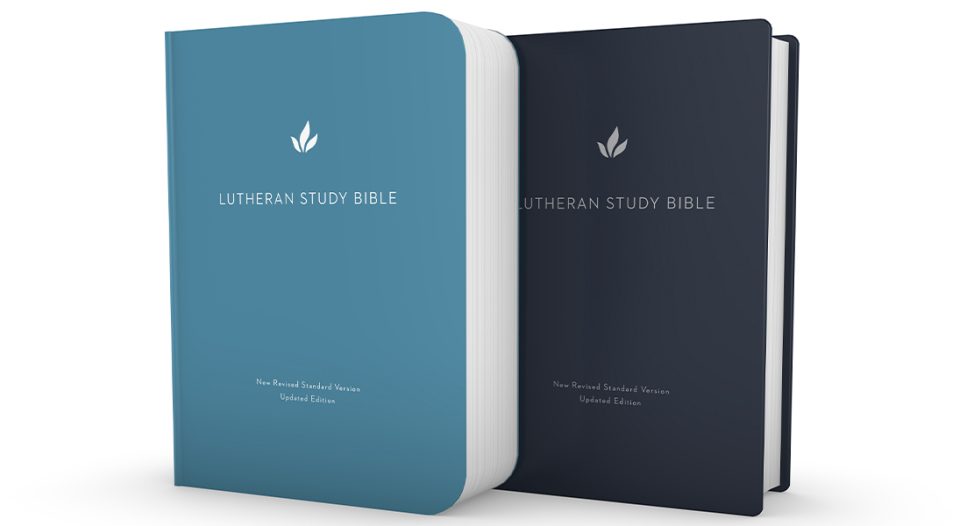Since the first edition of the Lutheran Study Bible was released in 2009, significant developments in biblical scholarship and archeological findings have occurred, as well as the publication of the updated edition of the New Revised Standard Version Bible (NRSVue).
On July 1, Augsburg Fortress released The Lutheran Study Bible, Second Edition, which features the NRSVue translation, along with introductions, notes and articles written by more than 50 ELCA pastors and teaching theologians. Living Lutheran spoke with Laurie J. Hanson, who recently retired as editor of congregational resources with Augsburg Fortress and co-edited the study Bible with ELCA Pastor Scott Tunseth, about the ways in which the new edition has been updated and how it came together.
Living Lutheran: How will the second edition of The Lutheran Study Bible be most helpful for readers?
Hanson: We thought it was important to have the newest and most up-to-date translation—not that there are huge new things in the [NRSVue], but it’s more accurate. And the Society of Biblical Literature that worked on that translation has done extensive footnoting, so even if there are alternative kinds of readings or translations of words, that’s footnoted.
You can look at what they decided is the most accurate translation, and then you can also look at what the alternatives are. Because not all the manuscripts for the Old and New Testaments agree—sometimes there are variations, and it’s helpful sometimes to see what those possibilities are and if they make any difference in the meaning of a passage.
What are some of the changes made for this edition?
We started with the material that was in The Lutheran Study Bible from 2009 and then went back to the original writers where we could and also brought in some new scholars and writers to review everything we had in the 2009 Bible and updated that.
We also added a couple of new articles. One is on interpreting the Bible in [the context of] Jewish-Christian relations. That was written by Esther Menn, who is chairing the ELCA’s Consultative Panel on Lutheran-Jewish Relations. She goes through a number of examples of [biblical passages] that have been misinterpreted or are slanted in a way that give an antisemitic reading, and she helps to give a more balanced look at what the Bible is actually saying and how it was written and some of the historical periods when passages in the Bible were taken to be more antisemitic.
You can look at what they decided is the most accurate translation, and then you can also look at what the alternatives are.
We also had Amy-Jill Levine, a Jewish scholar of the New Testament, review a number of books. She helped with some of the readings that in the past have been taken as [supporting] a stereotyped view of Jewish figures like the Pharisees, who have been looked at in a negative fashion.
And we added an article by Joy Moore called “The Greatest Story: To be Continued.” It talks about how it’s pretty natural for us to talk about movies and books we like and tell people, “Oh, you’ve got to see this, you’ve got to read this,” and how that same kind of thing should happen with this story of the Bible. Why isn’t the Bible something that goes viral? It should be, because of all the good news that’s in there. She does a great job talking about that in a very winsome way.
What are some of the features that Lutheran scholars developed for this edition?
The pastors and teaching scholars worked on the book introductions and the study notes and articles. We also have two big overviews, one of the Old Testament and one on the New Testament, that take an even bigger overall look at those two sections of the Bible. And in their work, they were reviewing and updating and adding new material as they went along.
And we had some people who’d done landmark work in their fields [for the first edition], like Terence E. Freithem on Genesis, and we were able to bring a lot of that material and carry it forward, but also have it reviewed and updated and brought in line with the most recent advances in scholarship. … We didn’t want to take some of this great work and just leave it behind.
There’s also a Bible study series that accompanies this edition. Could you tell readers about that?
There will be a series of Bible studies, the first two of which will be released at the time of the Churchwide Assembly this summer called “Together by Grace: Bible Conversations.” We want people to feel that they can read the Bible themselves, and then with a facilitator for this study guiding the conversation. They can talk about the Bible and ask questions and discuss, and maybe not come to a final answer, but the idea is that in the discussion, we can learn from each other, and God is speaking to us through the Bible and through that discussion. So two Bible studies will be released this summer and then there will be two more releasing in the fall, and that will continue for the next several years.






